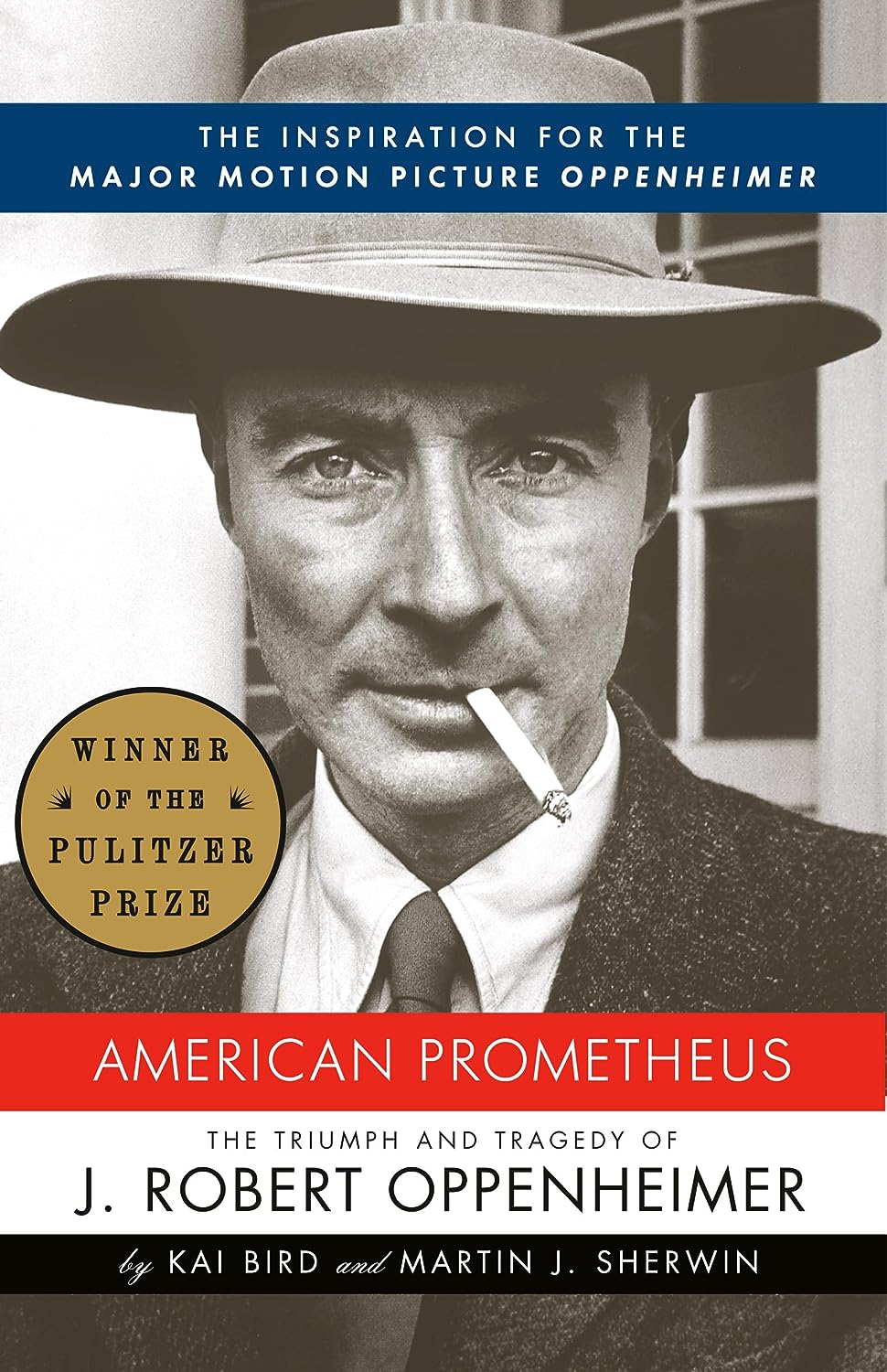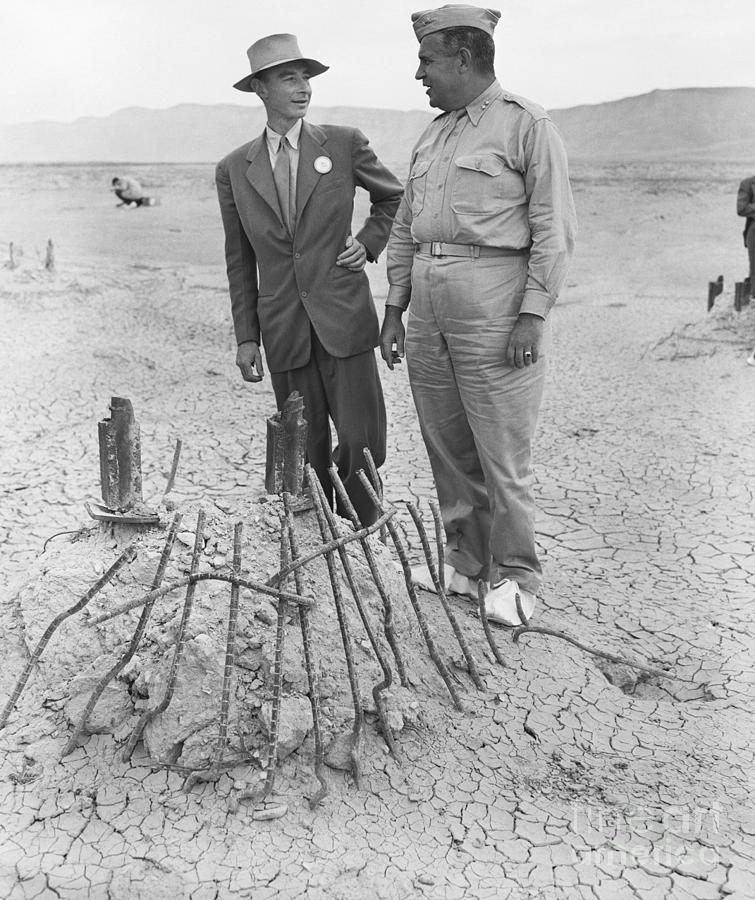 “American Prometheus” is best known as the foundation of the movie “Oppenheimer.” Written by Kai Bird and Martin J. Sherwin, its dual parentage is exposed in dual writing styles, and a crying need for a good book editor.
“American Prometheus” is best known as the foundation of the movie “Oppenheimer.” Written by Kai Bird and Martin J. Sherwin, its dual parentage is exposed in dual writing styles, and a crying need for a good book editor.
Nevertheless, it tells the story of J. Robert Oppenheimer’s triumphant and tragic life in complete detail right down to the man’s love affairs, martini-drinking, chain-smoking, and of course his genius and his independent thinking.
Oppenheimer was the intellectually gifted son of wealthy New York parents who raised him and his brother, Frank, in the traditions of secular Jewish culture. That meant that they attended the Ethical Culture School which produced in Robert a left-leaning polymath, who spoke several languages and came to love physics only after learning quantum physics in Germany as a graduate student.
In Göttingen he met Werner Heisenberg who was a pioneer in quantum mechanics, and who would later try, and fail, to create a nuclear bomb for the Nazis. At the time, Oppenheimer used Heisenberg’s work to explain why molecules were molecules and produced with Born, his advisor “On the Quantum Theory of Molecules,” a paper that is still regarded as foundational.
Oppenheimer moved on to Berkeley to establish a theoretical physics department next to Ernest Lawrence’s experimental physics laboratory, known as the RadLab because of its work in radiation. Oppenheimer’s department became the ‘go to’ place to be educated in theoretical physics.

In 1939, two Germans created fission by successfully splitting atoms of uranium by bombarding them with neutrons. On hearing the news, Oppenheimer was at first skeptical, but within 15 minutes was able to propose that fission could be used to make a bomb. “It was amazing to see how rapidly his mind worked . . . ,” said one person who was there.
It’s easy to see how Oppenheimer goes from that point in time to 1942 when Leslie Groves appointed him to run the technical aspects of the Manhattan Project, the name given to the secret project to build the atomic bomb.
Oppenheimer was a masterful organizer and manager of people, skills which his polymath mind took off and ran with during the project. There were, however, a couple of tension points which would later come back to haunt him.
One was that, when it became clear that Germany was defeated and that the atomic bomb would not be used there, most of the scientists on the project signed a letter saying that the bomb should not be used in Japan.

Second, Edward Teller constantly hounded Oppenheimer to build the so-called “super,” the hydrogen bomb. Oppenheimer disagreed – in fact he said it should never be built. As the government proceeded to build it, Oppenheimer’s reputation and security clearance went the other way.
The bomb was dropped (twice), the war was over, and Oppenheimer was a hero – briefly.
He was appointed to head the Institute for Advanced Study at Princeton University, but a few years later Lewis Strauss, chairman of the Atomic Energy Commission started after him, adding to the evidence against him his left-leaning past, including his brief, informal affiliation with the Communist party.
The nightmare went on for years culminating in a decision to remove Oppenheimer’s security clearance. He no longer had access to some of the nuclear secrets he created!
He kept on at the institute, writing papers and giving lectures for ten years when he decided to retire in 1965. Two years later his scratchy throat was determined to be cancer, and he died shortly after at the young age of 62.
If you want all the grim details of his cancer, and for that matter the Strauss hearings, I suggest that you read the book.
The book is a bit of a slog to get through, but it is thorough, very thorough.
John,
We finally saw the movie last night; I thought it was horrible. The movie doesn’t give emotional distress to a reader as you become part of Opie’s crew. It also gave Ann’s struggle with life a brief mention before her suicide and Opie’s involvement with the communist party, he was more of an outsider than a participant, and his loving relationship with his brother, also a physicist. The FBI investigation was brief, it left out important details. That was a sham in the movie. I give the movie Oppenheimer. ops, I mean “The American Prometheus,” a C= and the book a “B”, My copy is marked with notes to be reviewed when I reread it. Plus, the book was too segmented like puzzle pieces haphazardly put in the wrong place. As far as the movie, it was loaded with unnecessary pyrotechnics and too many of the important details were left out.
Thanks for your review which I anticipate after every read.
Ron
Oh, in the movie, I noticed Opie’s name pronounced either with a long O sound, or others pronouncing it with the short O sound. Isn’t this typical of the American speaker? No wonder ESL students had difficulty learning American English. 😒